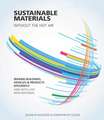Making the Modern World – Materials and Dematerialization: Gates Notes - Cărți recomandate de Bill Gates
Autor V Smilen Limba Engleză Paperback – 21 noi 2013
Over the course of time, the modern world has become dependent on unprecedented flows of materials. Now even the most efficient production processes and the highest practical rates of recycling may not be enough to result in dematerialization rates that would be high enough to negate the rising demand for materials generated by continuing population growth and rising standards of living. This book explores the costs of this dependence and the potential for substantial dematerialization of modern economies.
Making the Modern World: Materials and Dematerialization considers the principal materials used throughout history, from wood and stone, through to metals, alloys, plastics and silicon, describing their extraction and production as well as their dominant applications. The evolving productivities of material extraction, processing, synthesis, finishing and distribution, and the energy costs and environmental impact of rising material consumption are examined in detail. The book concludes with an outlook for the future, discussing the prospects for dematerialization and potential constrains on materials.
This interdisciplinary text provides useful perspectives for readers with backgrounds including resource economics, environmental studies, energy analysis, mineral geology, industrial organization, manufacturing and material science.
Din seria Gates Notes - Cărți recomandate de Bill Gates
- 17%
 Preț: 67.59 lei
Preț: 67.59 lei - 14%
 Preț: 72.63 lei
Preț: 72.63 lei - 16%
 Preț: 64.19 lei
Preț: 64.19 lei - 15%
 Preț: 81.22 lei
Preț: 81.22 lei - 22%
 Preț: 50.01 lei
Preț: 50.01 lei - 21%
 Preț: 56.33 lei
Preț: 56.33 lei - 16%
 Preț: 70.20 lei
Preț: 70.20 lei - 16%
 Preț: 58.13 lei
Preț: 58.13 lei -
 Preț: 69.34 lei
Preț: 69.34 lei - 24%
 Preț: 53.62 lei
Preț: 53.62 lei - 24%
 Preț: 82.56 lei
Preț: 82.56 lei - 25%
 Preț: 61.57 lei
Preț: 61.57 lei - 16%
 Preț: 69.60 lei
Preț: 69.60 lei - 17%
 Preț: 57.65 lei
Preț: 57.65 lei - 15%
 Preț: 70.33 lei
Preț: 70.33 lei - 20%
 Preț: 82.12 lei
Preț: 82.12 lei -
 Preț: 162.17 lei
Preț: 162.17 lei -
 Preț: 82.31 lei
Preț: 82.31 lei -
 Preț: 94.62 lei
Preț: 94.62 lei - 17%
 Preț: 109.29 lei
Preț: 109.29 lei -
 Preț: 121.70 lei
Preț: 121.70 lei -
 Preț: 150.83 lei
Preț: 150.83 lei - 5%
 Preț: 107.54 lei
Preț: 107.54 lei - 23%
 Preț: 84.51 lei
Preț: 84.51 lei -
 Preț: 381.75 lei
Preț: 381.75 lei - 14%
 Preț: 56.04 lei
Preț: 56.04 lei - 16%
 Preț: 69.04 lei
Preț: 69.04 lei - 16%
 Preț: 58.59 lei
Preț: 58.59 lei -
 Preț: 89.22 lei
Preț: 89.22 lei - 14%
 Preț: 72.35 lei
Preț: 72.35 lei -
 Preț: 108.58 lei
Preț: 108.58 lei - 18%
 Preț: 69.53 lei
Preț: 69.53 lei -
 Preț: 92.12 lei
Preț: 92.12 lei - 16%
 Preț: 58.18 lei
Preț: 58.18 lei - 15%
 Preț: 60.10 lei
Preț: 60.10 lei - 17%
 Preț: 57.52 lei
Preț: 57.52 lei -
 Preț: 150.31 lei
Preț: 150.31 lei -
 Preț: 82.44 lei
Preț: 82.44 lei - 18%
 Preț: 55.89 lei
Preț: 55.89 lei - 24%
 Preț: 62.36 lei
Preț: 62.36 lei - 22%
 Preț: 64.94 lei
Preț: 64.94 lei - 23%
 Preț: 63.84 lei
Preț: 63.84 lei - 14%
 Preț: 72.53 lei
Preț: 72.53 lei -
 Preț: 254.04 lei
Preț: 254.04 lei - 24%
 Preț: 62.77 lei
Preț: 62.77 lei -
 Preț: 73.70 lei
Preț: 73.70 lei - 16%
 Preț: 69.54 lei
Preț: 69.54 lei -
 Preț: 106.56 lei
Preț: 106.56 lei -
 Preț: 94.47 lei
Preț: 94.47 lei
Preț: 316.48 lei
Nou
60.56€ • 63.45$ • 50.06£
Carte tipărită la comandă
Livrare economică 12-26 aprilie
Specificații
ISBN-10: 1119942535
Pagini: 242
Ilustrații: black & white tables
Dimensiuni: 171 x 244 x 14 mm
Greutate: 0.39 kg
Editura: Wiley
Seria Gates Notes - Cărți recomandate de Bill Gates
Locul publicării:Chichester, United Kingdom
Public țintă
Researchers, Scientists, Engineers, Policy Makers, Energy Organizations, Government Advisors, ConsultantsDescriere
How much further should the affluent world push its material consumption? Does relative dematerialization lead to absolute decline in demand for materials? These and many other questions are discussed and answered in Making the Modern World: Materials and Dematerialization.
Over the course of time, the modern world has become dependent on unprecedented flows of materials. Now even the most efficient production processes and the highest practical rates of recycling may not be enough to result in dematerialization rates that would be high enough to negate the rising demand for materials generated by continuing population growth and rising standards of living. This book explores the costs of this dependence and the potential for substantial dematerialization of modern economies.
Making the Modern World: Materials and Dematerialization considers the principal materials used throughout history, from wood and stone, through to metals, alloys, plastics, and silicon, describing their extraction and production as well as their dominant applications. The evolving productivities of material extraction, processing, synthesis, finishing, and distribution, and the energy costs and environmental impact of rising material consumption are examined in detail. The book concludes with an outlook for the future, discussing the prospects for dematerialization and potential constraints on materials.
This interdisciplinary text will provide useful perspectives for readers with backgrounds including resource economics, environmental studies, energy analysis, mineral geology, industrial organization, manufacturing, and material science.
Textul de pe ultima copertă
How much further should the affluent world push its material consumption? Does relative dematerialization lead to absolute decline in demand for materials? These and many other questions are discussed and answered in Making the Modern World: Materials and Dematerialization.
Over the course of time, the modern world has become dependent on unprecedented flows of materials. Now even the most efficient production processes and the highest practical rates of recycling may not be enough to result in dematerialization rates that would be high enough to negate the rising demand for materials generated by continuing population growth and rising standards of living. This book explores the costs of this dependence and the potential for substantial dematerialization of modern economies.
Making the Modern World: Materials and Dematerialization considers the principal materials used throughout history, from wood and stone, through to metals, alloys, plastics, and silicon, describing their extraction and production as well as their dominant applications. The evolving productivities of material extraction, processing, synthesis, finishing, and distribution, and the energy costs and environmental impact of rising material consumption are examined in detail. The book concludes with an outlook for the future, discussing the prospects for dematerialization and potential constraints on materials.
This interdisciplinary text will provide useful perspectives for readers with backgrounds including resource economics, environmental studies, energy analysis, mineral geology, industrial organization, manufacturing, and material science.
Cuprins
Preface: Why and How ix 1. What Gets Included 1
2. How We Got Here 7
2.1 Materials Used by Organisms 8
2.2 Materials in Prehistory 11
2.3 Ancient and Medieval Materials 15
2.4 Materials in the Early Modern Era 22
2.5 Creating Modern Material Civilization 27
2.6 Materials in the Twentieth Century 34
3. What Matters Most 45
3.1 Biomaterials 46
3.2 Construction Materials 52
3.3 Metals 57
3.4 Plastics 62
3.5 Industrial Gases 65
3.6 Fertilizers 70
3.7 Materials in Electronics 72
4. How the Materials Flow 77
4.1 Material Flow Accounts 79
4.2 America s Material Flows 83
4.3 European Balances 87
4.4 Materials in China s Modernization 90
4.5 Energy Cost of Materials 94
4.6 Life–Cycle Assessments 103
4.7 Recycling 111
5. Are We Dematerializing? 119
5.1 Apparent Dematerializations 120
5.2 Relative Dematerializations: Specific Weight Reductions 122
5.3 Consequences of Dematerialization 129
5.4 Relative Dematerialization in Modern Economies 137
5.5 Declining Energy Intensities 143
5.6 Decarbonization and Desulfurization 150
6. Material Outlook 157
6.1 Natural Resources 158
6.2 Wasting Less 165
6.3 New Materials and Dematerialization 168
6.4 Chances of Fundamental Departures 173
Appendix A Units and Unit Multiples 181
Appendix B US Material Production, GDP and Population, 1900 2005 183
Appendix C Global Population, Economic Product, and Production of Food, Major Materials, and Fuels 1900 2010 185
Appendix D Global Energy Cost of Major Materials in 2010 187
Appendix E 189
References 191
Index 223
Recenzii
Notă biografică
VACLAV SMIL, Distinguished Professor Emeritus, University of Manitoba, Canada





















